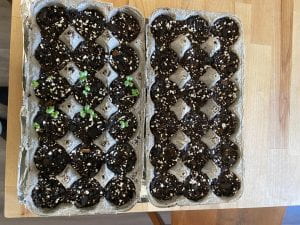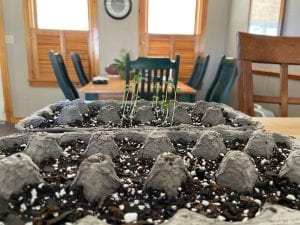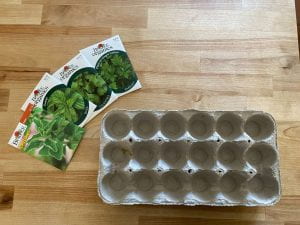After mulling over a plethora of different ecofeminist activist actions to focus on, my mind continuously was pulled back to my childhood backyard where I helped my mother raise chickens and plant vegetables in the garden. I was drawn back to Bell Hooks statement that “when we love the Earth, we are able to love ourselves more fully” (Hooks 363). Therefore, I thought what better way to connect the knowledge I have obtained this semester and the roots of my own place, than to create a garden myself.


By using old biodegradable egg cartons my roommates and I had used, I planted various vegetables including broccoli, onion, tomato, cucumber, and hot peppers. After only a week, the broccoli and tomato plants are already sprouting. My boyfriend was thrilled with the idea and is excited to be able to use the fresh produce we eventually harvest to cook with. To my pleasant surprise, once my roommate got home and saw that we were starting a vegetable garden, he was ecstatic and decided that he wanted to help contribute to the process by growing a herb garden.

I realized that one small action of starting a vegetable garden inspired others to do the same thing. Having conversations can have great influence, but getting actively involved can help to create an even greater change. I hope that by starting a garden, discussing it with my three roommates, and having them get involved, helps to influence other people to do the same thing. Eventually, once the garden is fully flourishing, I hope to spread the wealth by sharing the produce with my friends and family. Although it won’t be the largest garden, I thought about the impact that community gardens and urban gardens have on the community itself. By planting fresh produce, it has the ability to bring people together as well as benefit the overall health of the community.
Having fresh produce is also a luxury that not many people are able to have, whether they live in a food desert or they simply cannot afford it. Low-income women are more vulnerable to food insecurity (Smith 23). It was stated by Margaret Smith in a Fact Sheet called Gender and Food Insecurity: The Burden on Poor Women that in the United States, “Women living in areas likely to be food deserts are living at a crossroads of disadvantage, as they are more likely to be women of color and living in poverty” (Smith 24). Creating something as simple as a garden, can become a catalyst for change. By implementing urban gardens and community gardens it could help to create jobs as well as benefit the health of community members. In a TedTalk that I will link below, a man named Ron Finley from South Central LA started a vegetable garden that had a massive influence on the community. Finley describes planting your own food to “printing your own money” since one plant will produce hundreds of seeds to continue the cycle of planting and harvesting (Finley 2013).
Gardening can also help change the lives of women and help them become more connected to the earth. The Wen’s Soil Sisters program in the United Kingdom does just that. Women who have seeked refuge from domestic violence joined the program which helps to support them “on their journey to recovery, by connecting them to nature through gardening, food growing and environmental activities, often referred to as social and therapeutic horticulture” (Rasmussen 2019). Ultimately gardens have the ability to help heal, to help become a feminist leader, and to be once again connected to nature.
Link to the TedTalk: A Guerrilla Gardener in South Central LA
https://www.ted.com/talks/ron_finley_a_guerrilla_gardener_in_south_central_la?languag
Works Cited:
Finley, R. (2013). Ron Finley: A guerrilla gardener in South Central LA. [TedTalk]. https://www.ted.com/talks/ron_finley_a_guerrilla_gardener_in_south_central_la?languag
Hooks, Bell. Touching the Earth. 363-368.
Rasmuseen, S. (2019). Soil Sisters – Ecofeminism in Practice. Wen. https://www.wen.org.uk/2019/12/09/ecofeminism-in-practice/
Smith, M. (2012). Fact Sheet. Gender and Food Insecurity: The Burden on Poor Women. 23-29. https://socwomen.org/wp-content/uploads/2018/03/Fact-Sheet-Gender-and-Food-Insec..pdf
